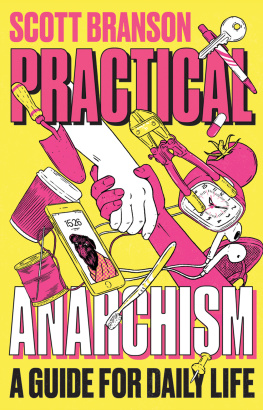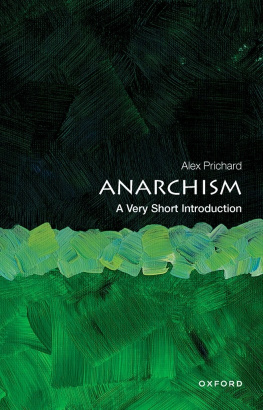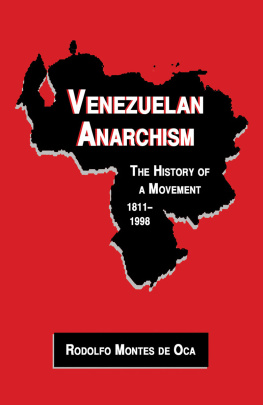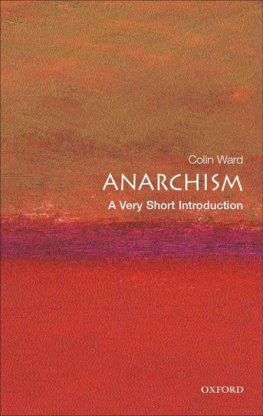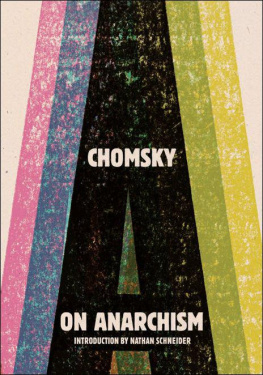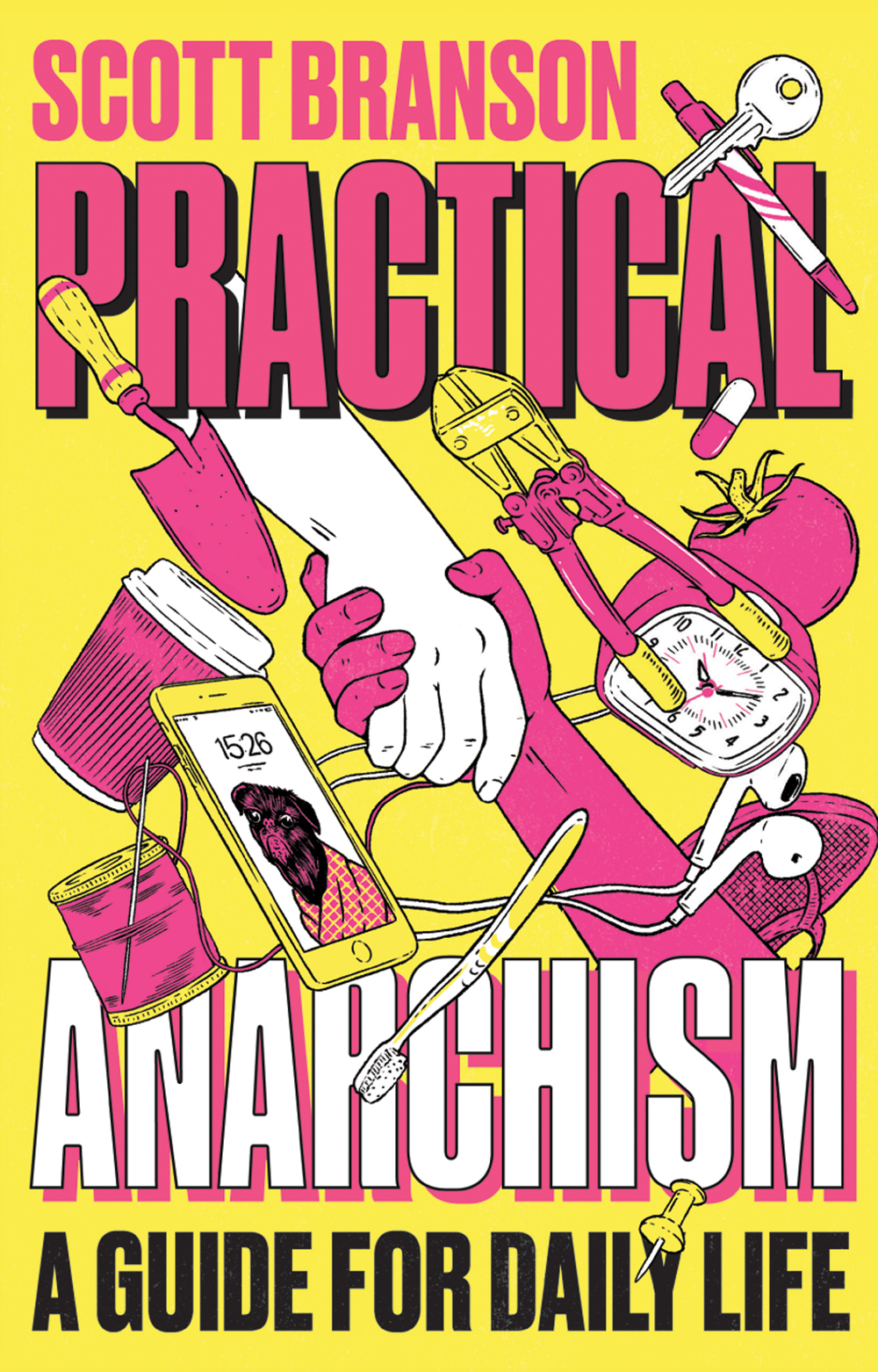Practical Anarchism
A joyful rethinking of anarchism. Branson draws on a wealth of cutting-edge theory and the messiness of activism to illuminate new ways to transform society. The result is a practical guide to everyday revolutions. A real treasure.
Alex Prichard, author of Anarchism: A Very Short Introduction
A clever, inspiring and accessible book! Bransons brilliant method of weaving together our collective and individual lives alongside our most complex relationships with the many (eco) systems that we are part of is truly refreshing and ground-breaking. I feel that I and many other radicals have walked the edges of so many of these conversations that Branson has skillfully and necessarily busted open. I sure wish I had read this book years ago, but other than that, I will share it with everyone I know! And especially with anyone who has ever told me my ideas were impractical and pie-in-the-sky naivety.
carla joy bergman, editor of Trust Kids! and co-author of Joyful Militancy: Building Thriving Resistance in Toxic Times
Scott Branson denaturalizes property and hierarchy in every dimension of human life. Steeped in historical and archival knowledge of Black and queer proletarian feminisms and decolonial struggles against the state, Practical Anarchism is a powerful guide to the collective manufacture of utopia now.
Sophie Lewis, author of Abolish the Family: A Manifesto for Care and Liberation
Scott Branson confidently weaves political theory into everyday practice to expose the affinities between anarchism and contemporary anti-oppression politics and closes the gap between imagined futures and their creation. Practical Anarchism presents clear, astute critiques of work, school, and the destruction of community in capitalism, and serves as a handbook for liberation, both gently optimistic and intensely motivating.
Ruth Kinna, author of The Government of No One: The Theory and Practice of Anarchism
Anarchisms record as a political movement might be shaky. We have seen no large-scale, long-term anarchist society. Yet, anarchisms record as an ethical guideline stands tall. Time and time again, anarchists have been involved in improving social relationships, empowering dispossessed and marginalized communities, and supporting struggles on the right side of history. In this highly readable and passionate book, Scott Branson sheds a light on many examples of everyday anarchist engagement and its rich contribution to making the world a better place.
Gabriel Kuhn, author of Soccer vs. the State: Tackling Football and Radical Politics
Practical Anarchism hands us an anarchist kaleidoscope, inviting us to shake up this world and see the endless array of beautiful possibilities that are already present in the here and now. It offers this delightful gift not so that we may view an infinity of ever-shifting promise as mere spectators but rather as a reminder that we ourselves are continually engaged in creating collective care and freedom. Its what Id call everyday anarchismthe making and doing, routinely, of lives worth living for everyone. This booktender, dreamy, actionableinspires us to pick up all the sparkly, even if sometimes jagged, edges of daily life that too often go unnoticed and toss them, time and again, into utopian play.
Cindy Barukh Milstein, author of Try Anarchism for Life: The Beauty of Our Circle
Deftly and joyfully shows us that lives lived with compassion and collective autonomy in the engagements we call anarchy have practical applications in our everyday living individually and collectively.
scott crow, insurgent, author of Black Flags and Windmills: Hope, Anarchy and the Common Ground Collective
Scott Branson offers a unique and much-needed intervention in traditional anarchist thought to argue that anarchismwhether its identified as such or notis a seed in most of our liberation practices and ideas. Their perspective comes from radical organizing experience, rigorous study of critical race and queer theory, as well as their commitment to their relationships and communities. Weaving practical advice alongside women of color, queer activists, abolitionists, and more, Branson offers us a beautiful reminder that we do anarchism everydaythrough care, through imagining, through lovingagainst and in spite of the state. In a moment where it is easy to feel hopeless, Practical Anarchism is a fresh and unique take on how creating new worlds free of hierarchy and domination is a practice were already doing. And Branson offers us the tools to help it grow. This brilliant book is an antidote to giving up.
Raechel Anne Jolie, author of Rust Belt Femme
Practical Anarchism
A Guide for Daily Life
Scott Branson

First published 2022 by Pluto Press
New Wing, Somerset House, Strand, London WC2R 1LA and Pluto Press Inc.
1930 Village Center Circle, Ste. 3-384, Las Vegas, NV 89134
www.plutobooks.com
Copyright Scott Branson 2022
The right of Scott Branson to be identified as the author of this work has been asserted in accordance with the Copyright, Designs and Patents Act 1988.
British Library Cataloguing in Publication Data
A catalogue record for this book is available from the British Library
ISBN 978 0 7453 4493 5 Hardback
ISBN 978 0 7453 4492 8 Paperback
ISBN 978 0 7453 4496 6 PDF
ISBN 978 0 7453 4494 2 EPUB
This book is printed on paper suitable for recycling and made from fully managed and sustained forest sources. Logging, pulping and manufacturing processes are expected to conform to the environmental standards of the country of origin.
Typeset by Stanford DTP Services, Northampton, England
Simultaneously printed in the United Kingdom and United States of America
Contents
Who Will Fix the Roads and Collect the Trash?: Anarchy in
Your Neighborhood
Introduction
The true focus of revolutionary change is never merely the oppressive situations that we seek to escape, but that piece of the oppressor which is planted deep within each of us, and which knows only the oppressors tactics, the oppressors relationships.
Audre Lorde, Age, Race, Class, and Sex:
Women Redefining Difference
How to Survive the Future
The main argument of this book is that anarchism is a name for something most of us already do. The name itself matters less than the doing. In writing this book, my objective is to reach out to those of you who havent already developed tactics of survival and interdependence, or who havent yet recognized the rebellion that you already live every day. In a simple way, my argument for anarchism is a process of denaturalizing all the aspects that structure our lives in ways that seem unquestionable, and reframing ways of relating to the people in our lives and the world that surrounds us from the point of view of care and freedom. While anarchism as a political ideological term has a recent and European origin, the ways of living that anarchism describes have long been practiced in various places, to varying degrees, throughout history and beyond. Those histories get buried in attempts to naturalize a view of the human that needs hierarchy, order, control, domination, and security. The truth that many anarchist writers have already tried to show over the years is that when it comes down to it, people tend to organize themselves quite well without domination and hierarchy. It takes a certain amount of (constant, everyday) violence to maintain the power structures of the state, the market, and gendered, racialized, and sexual differences, which make us feel dependent on answers coming from above.

